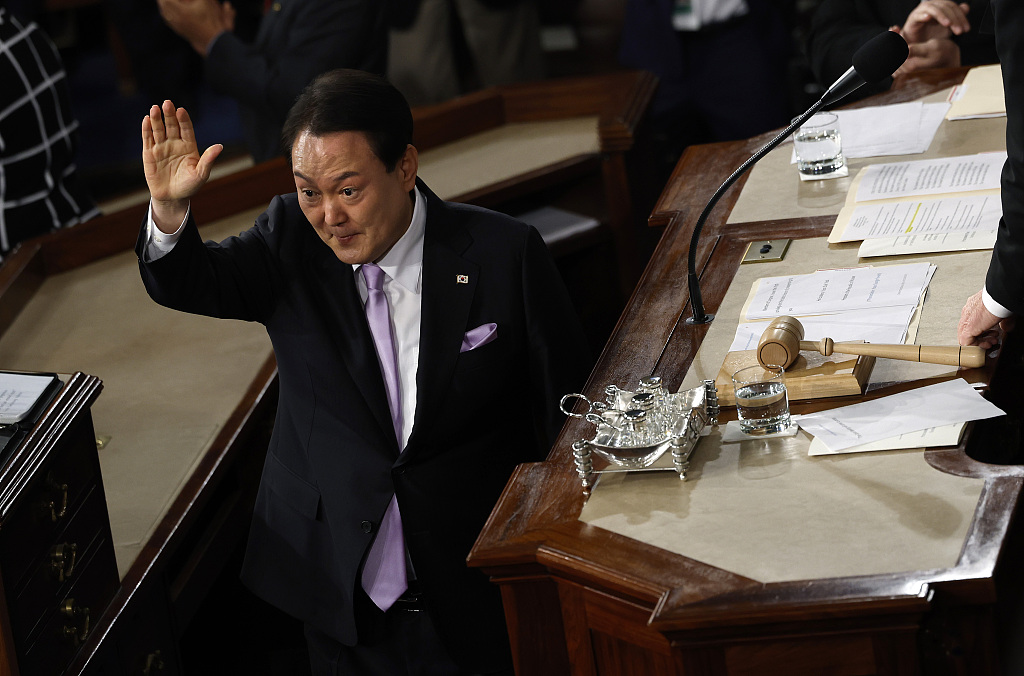
ROK President Yoon Suk-yeol waves as he arrives to address a joint meeting of Congress in the House Chamber at the U.S. Capitol in Washington, United States, on April 27, 2023. [Photo/VCG]
During his recent speech at the U.S. Congress, South Korean President Yoon Suk-yeol criticized "false propaganda" and "disinformation." This statement is consistent with President Yoon's stance since taking office, as he frequently mentions "freedom" and "democracy," while linking "false propaganda" and "disinformation" to "value diplomacy." This closely aligns with the diplomatic context of the Biden administration in the United States.
Yoon's diplomatic visit to the United States was welcomed with high honors, but it seems that the issues of national security and development highlighted before his departure by the South Korean newspaper, the JoongAng Daily, were not addressed. For instance, the monitoring of critical South Korean government departments by U.S. intelligence agencies. If the U.S. had not publicly acknowledged the leaked documents' authenticity, South Korea would have considered them "disinformation." Therefore, it appears that the Yoon government perceives "false propaganda" and "disinformation" differently. While his own government is under surveillance by U.S. intelligence agencies, Yoon criticized and condemned the use of "false propaganda" and "disinformation" during his speech at the U.S. Congress, which is somewhat ironic.
Ahead of Yoon's U.S. visit, Korean media reported on the scandal involving leaked U.S. documents. This included the National Security Office in South Korea being monitored by the U.S., with conversations of senior officials being recorded, and that under the pressure of the U.S., South Korea may have to provide military assistance to Ukraine. This information had been circulating online for several days.
However, Kim Tae-hyo, the first deputy director of the National Security Office, claimed that most of the leaked information related to South Korea was fake, and that no evidence of malicious surveillance by the U.S. had been found following an investigation. Kim made two statements regarding the U.S. document leak scandal: First, he claimed that the documents were mostly "disinformation," with the part related to South Korea being particularly untrue, as per the definition of "disinformation" by the South Korean government, at least according to the National Security Office. Second, he stated that even if the U.S. was monitoring, it was not malicious. However, the U.S. quickly contradicted Kim, admitting the authenticity of most of the leaked documents and claiming that it would thoroughly investigate the leak, without making any mention of halting its surveillance.
Kim's response was a typical case of "false propaganda," dismissing the fact that the U.S. was monitoring South Korea and portraying it as "non-malicious" in order to prioritize the "value" of U.S.-South Korea relations over the South Korean people's national dignity. South Korean newspaper The Hankyoreh acknowledges that the U.S. has been monitoring South Korean presidents, which is an open secret going back more than 40 years. In the 1970s, the CIA wiretapped then-President Park Chung-hee, with The New York Times disclosing detailed methods, further confirming the eavesdropping. As for whether it is "malicious" or not, that's for Kim and his colleagues to decide. South Korean film "The Man Standing Next" also touched on Americans installing listening devices in the South Korean president's office, with the country's intelligence agencies being completely unaware. The president in the film was indignant, saying: "They're taking us for fools! How dare they bug the president's desk! … Get me the ambassador! Have him kneel before the flag. Korea's pride is on the line!" Compared with Kim's rhetoric, these lines in the film seem to be closer to what South Koreans think. Either Kim falsely peddled the idea of "non-malicious tapping" by the U.S., or the South Korean film falsely peddled the country's indignant stance. One of these must be true.
While South Korea labeled the "leaked documents" as "forged" and false information, the U.S. defined them as "leaks." The difference between the two sides on the same issue speaks for itself. As the perpetrator, the U.S. did not deny eavesdropping, only noting that it would investigate the loopholes in its intelligence system; whereas South Korea, which is the victim in this case, denied the fact of having been harmed, let alone accepted its victim status. The "false propaganda" and "disinformation" that Yoon criticized in his speech to the U.S. Congress in fact match the roles that the two countries play. Of course, his goal was merely to emphasize that the two countries share common values and to avoid any rifts that may cast a shadow over bilateral relations.
In addition to factual errors, President Yoon has changed South Korea's national narrative to a large extent since taking office, which may be a major issue related to the direction of the country's development. Once they deviated from this path, what awaited them was not merely "false propaganda," but also mistakes in strategic narrative. As Yoon noted in his speech to Congress, false propaganda and disinformation are distorting truth and public opinion and threatening democracy and the rule of law. Indeed! However, decisions made without listening to the opinions of the people can have even more catastrophic consequences.





